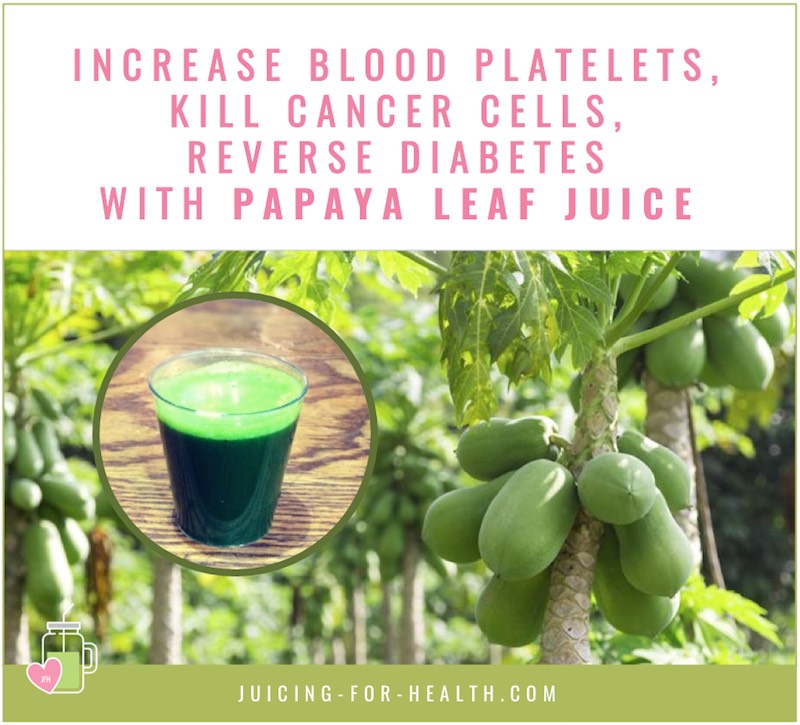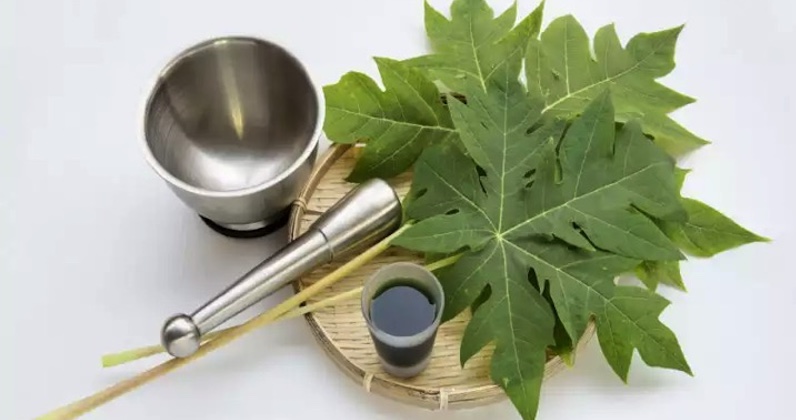Increase Blood Platelet Count, Kill Cancer Cells, Reverse Diabetes With Papaya Leaf Juice
Last updated on
You know papaya as one of the most delicious tropical fruits, but did you know the leaves of this fabulous plant are jam-packed with health benefits that are almost miraculous?
Granted, papaya leaves may be a little trickier to get than the actual fruit—but hey, you can find anything on the internet nowadays.
We’ll start our list with one of the lesser-known health effects of papaya: its leaves increase platelet count.
But what can cause low platelet count in the first place? And what exactly is a “low” platelet count?
Low Platelet Count: How Low Is “Too Low”?
Platelets (thrombocytes) are blood cells that are responsible for blood clotting. When a blood vessel is damaged, platelets stick one to another, then this platelet ball is strengthened with collagen, calcium, and a few other blood components—voila, you’ve got yourself a pretty clot to fix the damage and stop the bleeding!
The normal range of platelets is 150 to 450 thousand cells per microliter of blood, and everything below 150 thousand cells can be characterized as a low platelet count.
Without a good number of platelets, your body won’t be able to stop the bleeding after any kind of damage, and when the platelet count drops below 25-30 thousand cells per microliter, spontaneous bleeding (without any damage whatsoever) can happen anywhere in the body.
Common Causes of Low Platelet Count
The most common causes of low platelet count:
- Deficiency in vitamin B12 (or cobalamin)
- Severe dehydration
- Liver failure
- Autoimmune diseases (immune thrombocytopenic purpura)
- Some medications (methotrexate, interferon, isotretinoin, etc.)
- Zika virus
- Dengue fever
The highest number of studies done on the matter of papaya leaves and platelet count was made to check if it would help with dengue fever, probably because the disease is widely spread in the same parts of the world where papaya is easily accessible (tropical countries like Brazil, Malaysia, Thailand, and so on).

Papaya Leaf Juice Increases Blood Platelet Count
-
In Dengue Fever
The dengue fever is a tropical infection caused by the dengue virus and transmitted by mosquitoes. 50 to 528 million people get diagnosed with it and about 20 thousand people die from it every single year.
Although dengue fever is a self-limiting disease (meaning it will pass on its own even if you don’t treat it with anything), it can lead to life-threatening complications.
One of these complications is platelet destruction, which quickly leads to low platelet count, generalized bleeding, and death.
The destruction of platelets is one of the most dangerous components of the dengue fever, so it’s just fabulous that so many studies are pointing out the impact that such a simple natural treatment like papaya leaf juice can have.
- Just 50 ml (less than 2 ounces) of papaya leaf juice once per day for 3 days straight was enough to significantly raise the level of platelets of all 114 subjects in this 2013 study.
- In 2014, another study reported a five-five-fold increase in platelet count (from 28 to 138 thousand per microliter of blood) in a young man suffering from dengue after just 5 days of taking papaya leaf juice.
- In 2016, a study confirmed that papaya leaf extract capsules were incredibly effective as well, starting from the third day of administration, with no side effects.
-
Autoimmune Disease – Thrombocytopenic Purpura
Another great thing is that papaya leaf extract seems to do wonders not just in cases of dengue fever but in any case of low platelets.
For example, the dreadful immune thrombocytopenic purpura, an autoimmune disease that targets and destroys platelets, can be successfully treated with papaya leaf juice!
But enough with the platelets, let’s see what else you can expect from this wonderful plant.
Other Confirmed Health Benefits of Papaya Leaves
-
Kill some types of cancer
Several studies have reported that papaya leaf decoction, a traditional folk remedy from the Australian plains, effectively kills skin cancer cells (namely squamous cell carcinomas).
Other papers have confirmed that papaya leaf extract can kill breast cancer cells and slow down the growth of prostate cancer.
-
Improve the functions of both the liver and the pancreas
Animal studies have discovered that papaya leaf extract is able to lower blood sugar, improve blood cholesterol, and generally improve the health of the liver and pancreas in diabetic research animals. More studies are needed to confirm this effect, but that’s a fabulous start!
-
Protect from stomach ulcers and is a powerful antioxidant
Papaya leaf extract is also a powerful antioxidant, so it’s able to effectively protect the lining of the stomach from free radical damage.
The antimicrobial juice reduces inflammation of the stomach lining and heals peptic ulcers by killing harmful bacteria such as the H.pylori bacteria. This healing process may also reduce colon inflammation from inflammatory bowel diseases (IBD).
-
Have anti-inflammatory properties
In an animal study from 2008, it was confirmed that papaya leaf extract taken in low to moderate doses shows anti-inflammatory potential, particularly in reducing joint swelling during arthritis.
-
Heal gum bleeding and inflammation
When used as a mouthwash, papaya leaf extract effectively soothes gum inflammation and heals gum bleeding. That’s the power of healthy platelets for you!
-
May have neuroprotective potential
This last study is fresh from 2018, and it reports that papaya leaf extract seems to protect the brain from abnormal changes in its balance of signaling molecules.
Theoretically, this could help in treating such conditions like Alzheimer’s and Parkinson’s diseases, but more data is needed to say for sure.
-
Lower blood sugar levels
Papaya leaf juice improves insulin sensitivity that helps regulate blood sugar levels.
The high antioxidants content is helpful to decrease the secondary complications of diabetes such as fatty liver, kidney damage and greatly reduces oxidative stress.
How To Consume Papaya Leaf Juice
There are several ways to consume papaya leaf juice.
1. Juice Papaya Leaves
If you have a juicer, you can simply put the (cleaned) leaves through your juicer to extract the juice. A masticating juicer does the job best. Juice and store away a small bottle of the juice in the fridge to be consumed within 4-5 days.
If you don’t have a juicer, a blender will do but you will have to do a little more work. Crush about 10 leaves and put into your blender with a cup of pure drinking water. Blend the leaves and strain out the juice using a cheese or muslin cloth.

Caution: Papaya leaf juice is horribly bitter and extremely potent. Start with only one tablespoon a day and work up to a maximum of two tablespoons a day, if taking for therapeutic purpose. Drink it neat. DO NOT drink water (or other fluids) immediately after, to allow the concentrated juice to work its miracle.
As mentioned in the study, just about 50ml (less than 2 ounces) a day of the juice is enough to help bring up the blood platelet count.
For health maintenance, consume just one tablespoon of papaya leaf juice a day for your liver health, and to benefit from its antioxidant and anti-inflammatory properties.
2. Make a Tea Infusion With Papaya Leaves
Use about 3-5 medium-to-large leaves to about two liters of water (about two quarts). Boil the leaves in the water till it’s reduced to about half the quantity. Leave it to cool, discard the leaves and consume in small doses as needed.
The tea may be stored in the fridge for up to 5 days, but drink it as fresh as possible to benefit from its nutrients.
3. Consume Papaya Leaf Extract
If you have no access to papaya leaves where you live, then the next best option is to use papaya leaf extracts.
Papaya leaf extracts are available in the forms of capsules, tea leaves and tincture. Be sure to choose non-GMO and organic extracts as papaya is mostly GMO in the U.S. Here’s a good place to buy quality papaya leaf extract.
Nature has given you all the nutrients, herbs, leaves, and produce you need to enjoy a long, healthy life. Work papaya leaf juice into your juicing routine to help you get all of its unique healing properties and enjoy a higher quality of life.
Some of the links I post on this site are affiliate links. If you go through them to make a purchase, I will earn a small commission (at no additional cost to you). However, note that I’m recommending these products because of their quality and that I have good experience using them, not because of the commission to be made.
Comments
Leave a Reply

































 JOIN OVER
JOIN OVER
I have started taking papaya leaf juice is an effort to increase my platelet count and, hopefully, to treat the purpura that I have. Can you please tell me if one can stop drinking the juice if the platelet count gets to a normal level, or should I prepare to keep this juice as part of my daily routine for long term use?
Can leaves of small plant be used will it help cryptococcus menengitites and AIDS patients
Where can I buy this papaya Leaf concentrate??
Wow great
Great news indeed, thanks with your great research ever.